Your ultimate guide to parasite giardia and treatments
Here’s everything you need to know about parasitic giardia, its symptoms, causes, treatments, and when to consult your specialist.
Your ultimate guide to parasite giardia and treatments
Here’s everything you need to know about parasitic giardia, its symptoms, causes, treatments, and when to consult your specialist.
y
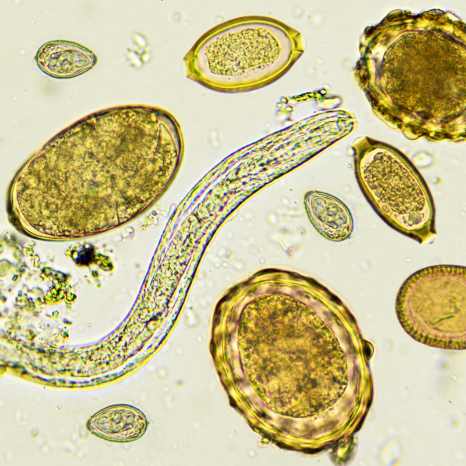
What is parasite giardia?
Giardia is a microscopic parasite that infects the intestines of both humans and animals. The most common species that infects humans is giardia lamblia. This parasite is found worldwide and the infection it causes is known as giardiasis.
Giardiasis is an infection of the small intestine caused by the microscopic parasite giardia lamblia. The transmission of giardia occurs through the ingestion of water or food contaminated with the cysts of the parasite. Additionally, person-to-person transmission can occur, and pets, including dogs and cats, can also be a source of infection.
The prevalence of giardiasis can vary but is found all over the world, while it’s more common in areas with poor sanitation and water quality control. Overcrowded and developing regions may have higher rates of giardiasis infection due to challenges in maintaining clean water sources and implementing effective hygiene practices.
If you suspect you or someone known to you may have giardiasis or is experiencing symptoms, seeking medical attention for proper diagnosis and treatment is important.
What is parasite giardia?
Giardia is a microscopic parasite that infects the intestines of both humans and animals. The most common species that infects humans is giardia lamblia. This parasite is found worldwide and the infection it causes is known as giardiasis.
Giardiasis is an infection of the small intestine caused by the microscopic parasite giardia lamblia. The transmission of giardia occurs through the ingestion of water or food contaminated with the cysts of the parasite. Additionally, person-to-person transmission can occur, and pets, including dogs and cats, can also be a source of infection.
The prevalence of giardiasis can vary but is found all over the world, while it’s more common in areas with poor sanitation and water quality control. Overcrowded and developing regions may have higher rates of giardiasis infection due to challenges in maintaining clean water sources and implementing effective hygiene practices.
If you suspect you or someone known to you may have giardiasis or is experiencing symptoms, seeking medical attention for proper diagnosis and treatment is important.
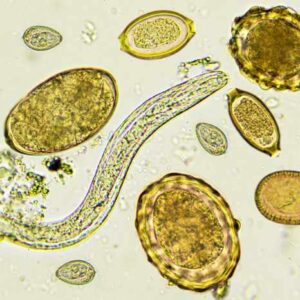
How does parasite giardia spread?
Giardiasis is primarily spread through the ingestion of giardia lamblia.
The most common modes of transmission are:

Contaminated water or fluids
Drinking water that has been contaminated with giardia cysts is a common way the infection is spread; this often occurs in areas with inadequate water treatment or sanitation systems, which allows the parasite to survive and be transmitted through water sources.
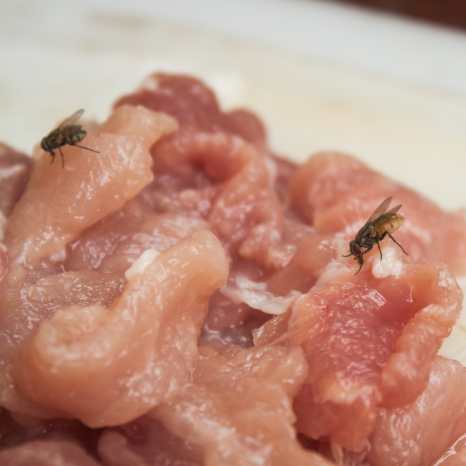
Contaminated food
Consuming food that has been contaminated with giardia cysts, which tends to occur whilst food is prepared or washed with contaminated water or when hands are not properly washed after using the bathroom, leads to the transmission and presence of parasites in food.
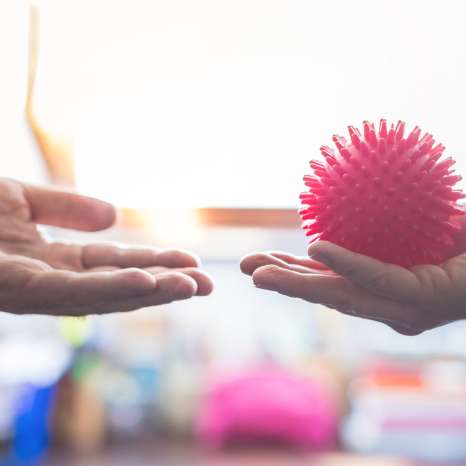
Person-to-person transmission
Parasite giardia tends to be transmitted from person to person, especially in situations where hygiene is compromised, and most often this tends to occur in crowded environments when bathing in natural pools or lakes, allowing the infection to spread easily.
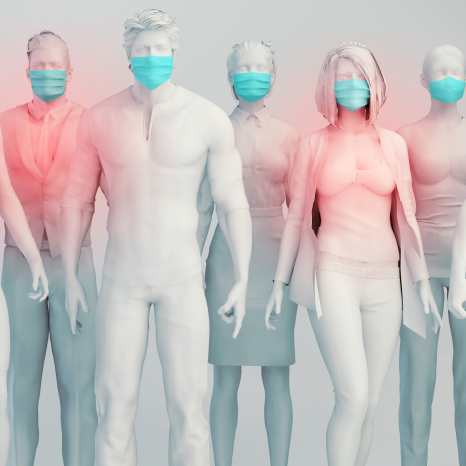
Contact with infected individuals
Direct contact with an infected person, especially with faecal matter, can result in the transmission of giardia, which is more likely to happen in settings where personal hygiene is not maintained well when bathing in natural pools and contact in crowded areas.
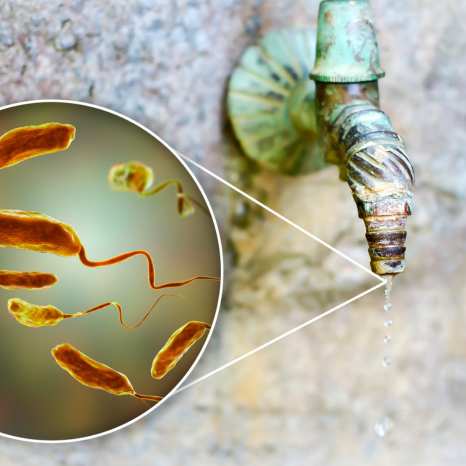
Contact with contaminated surfaces
Giardia cysts can survive on surfaces for some time, and contact with contaminated surfaces, objects, or soil can lead to infection if the cysts are ingested; this often happens if the patient does not sanitise, wash hands, or practise good sanitation.

Pet transmission
Contact with contaminated faeces or contaminated environments which pets have been occupying can lead to parasite transmission to humans; this happens if the patient does not sanitise, wash hands, or practise good sanitation habits after interacting with animals or pets.
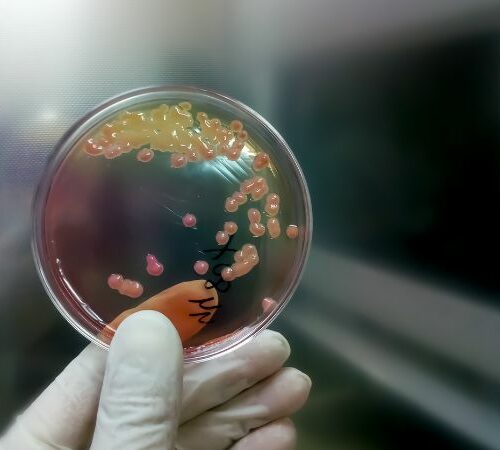
What are the symptoms of giardiasis?
Giardiasis usually causes symptoms in your digestive tract. Symptoms tend to vary and may be mildly irritating. You may not even display any symptoms.
Giardiasis symptoms include:
- Dehydration
- Weight loss
- Bloating or gas
- Loss of appetite
- Abdominal cramps
- Wet or loose stools
- Constantly feeling tired
- Nausea or the urge to vomit
- An unsettled and uncomfortable sensation in the stomach
What are the symptoms of giardiasis?
Giardiasis usually causes symptoms in your digestive tract. Symptoms tend to vary and may be mildly irritating. You may not even display any symptoms.
Giardiasis symptoms include:
- Dehydration
- Weight loss
- Bloating or gas
- Loss of appetite
- Abdominal cramps
- Wet or loose stools
- Constantly feeling tired
- Nausea or the urge to vomit
- An unsettled and uncomfortable sensation in the stomach
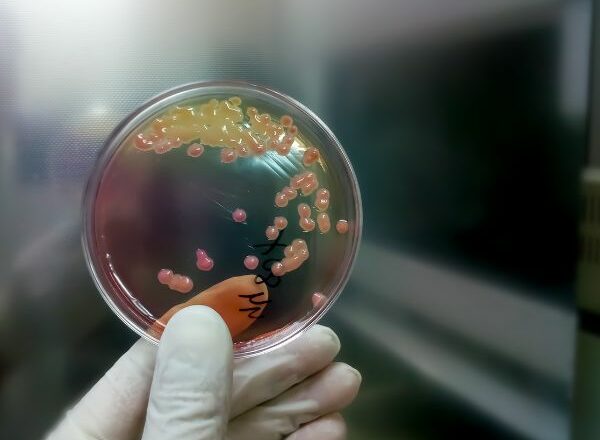
How is giardiasis diagnosed?
The diagnosis of giardiasis typically involves laboratory tests to detect the presence of the giardia parasite in stool samples.
Some diagnostic methods include:
Stool sample examination
A stool sample is collected and examined under a microscope to look for the presence of giardia cysts or trophozoites (two stages of the lifecycle of a parasite), after which antigen testing, enzyme immunoassays (EIA), or immunofluorescence assays can be used to examine specific giardia antigens in stool samples—faster than traditional microscopy.
Duodenal aspirate or biopsy
In some cases, particularly when stool samples are repeatedly negative but medical suspicions are high, a healthcare provider may perform an upper endoscopy to obtain a sample directly from the first part of the small intestine for examination.
String test
The string test involves swallowing a gelatin capsule containing a string, after which the capsule dissolves in the stomach and the string is retrieved from the small intestine. Then the material adhering to the string is examined for the presence of giardia.
Blood tests
This is not a commonly used method for primary diagnosis but blood tests can detect antibodies to giardia. However, these tests are more useful for assessing past exposure rather than present or active infection.
It’s important to note that the timing of sample collection can impact the sensitivity of diagnostic tests. If you suspect you have giardiasis or are experiencing symptoms, it’s crucial to consult a healthcare professional. They can guide you through the appropriate diagnostic process and recommend treatment if necessary. Self-diagnosis and treatment are not recommended, as mismanagement of the infection can lead to complications or a persistent infection.
How to prevent giardiasis
Sadly, prevention of giardiasis is near impossible but risks can be lowered by practising proper hygiene and sanitation.
In areas where giardiasis is more prevalent, public health measures such as water treatment and education on hygiene practices play a crucial role in preventing the spread of the infection.
- Using protection for insect bites and animal engagement
- Steering clear of contact with animal faeces, especially during pregnancy
- Practising safe sex by using protection, such as condoms, during sexual activity
- Ensuring thorough cooking of food to its recommended internal temperature and using timers to prevent undercooked meals
- Maintaining regular handwashing, especially after handling raw food or cleaning up after bowel movements
- Opting for clean or bottled water with purification seals and refraining from drinking untreated water from unfamiliar sources like lakes or streams
See a gastrointestinal specialist today
Seeking timely treatment is crucial in preventing the spread of infections. The dedicated team at the Sydney Gut Clinic comprises highly experienced gastrointestinal specialists ready to offer support and treatment for various gastrointestinal conditions. If you suspect a parasitic infection, schedule an appointment with our reputed clinic promptly.
For those exhibiting parasite symptoms, we advise you to visit our clinic for a consultation for a parasite cleanse in Australia.

See a gastrointestinal specialist today
Seeking timely treatment is crucial in preventing the spread of infections. The dedicated team at the Sydney Gut Clinic comprises highly experienced gastrointestinal specialists ready to offer support and treatment for various gastrointestinal conditions. If you suspect a parasitic infection, schedule an appointment with our reputed clinic promptly.
For those exhibiting parasite symptoms, we advise you to visit our clinic for a consultation for a parasite cleanse in Australia.



FAQs
What are the signs of giardia?
The giardia parasite can present itself with various symptoms. Not everyone infected with giardia will necessarily show symptoms, but when symptoms do occur, they can include diarrhoea, abdominal cramps, nausea, fatigue, weight loss, flatulence, and dehydration.
What happens if giardia is left untreated?
If left untreated, giardiasis can lead to various complications and persistent symptoms, chronic or recurrent symptoms, malabsorption, dehydration, weakened immune system, post-infectious syndrome, and impact on mental health.
How long does giardia last in humans without treatment?
There is no set duration for how long giardia infections can last in humans as it tends to vary. In some cases, individuals may clear the infection on their own without experiencing symptoms, whilst others may develop symptoms that persist for several weeks or even months. The ability of the body to naturally clear the infection can depend on various factors, including the individual’s immune response, overall health, and the specific strain of giardia involved.
